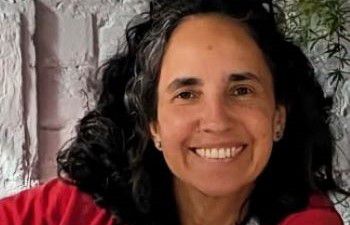Broadcast: News items
Five minutes with Maria Clara Castellanos: “Discovering nature changed me”
Posted on behalf of: Internal Communications
Last updated: Thursday, 26 June 2025

Dr Maria Clara Castellanos, Associate Professor in the Department of Ecology & Evolution (School of Life Sciences) is co-lead of Soapbox Science Brighton, which celebrates women and non-binary scientists by holding engaging events where they can talk about their work with the public. Maria Clara works with co-lead Dr Beth Nicholls and the wider Soapbox Science team on the initiative and they held their latest event on a windswept Brighton seafront on 24 May. Find out more and take a look at photos of the day.
Soapbox Science aims to bring women-led science to the streets and break stereotypes about what a scientist looks like. These stereotypes – amazingly – still persist! The initiative started in London, and a group of us thought it would be a success to run it on the seafront in Brighton so that people on their walks would suddenly find themselves surrounded by brilliant and engaging female scientists. I have been part of the organising team for Soapbox Science Brighton since it started in 2017 and have co-led the last two events.
I am an evolutionary ecologist. My research concerns plants and how they adapt to their animal pollinators and environmental factors such as wildfires. In my group we spend a lot of time in the field and the greenhouse studying wild and crop plants, hoping to understand how they cope with environmental change. As part of two new EU-Horizon projects, we also contribute to the conservation and restoration of plant-pollinator interactions.
Flower features in animal-pollinated plants are adaptations to attract and reward animals in exchange for pollination. These exquisite adaptations like flower shape, colour, and nectar are the product of millions of years of evolution, but we have been discovering how they can in fact adapt in a matter of decades in response to human-induced changes. Foxgloves naturalised in the Americas, for example, are now pollinated by hummingbirds and rapidly responding to new selection. Wild organisms are having a difficult time responding to drastic environmental change, but evolution is an extraordinary force that provides resilience in some cases.
Sussex offers a unique combination of brilliant and diverse colleagues and students, with an amazing campus. In the Ecology & Evolution department we do many projects that take advantage of our uniquely green surroundings, from undergraduate teaching trips to Stanmer Park to PhD-level experiments in the fields on campus that many people don’t even know about.
As I child I lived in large cities in Latin America and never imagined becoming a field biologist. But before I was 20, I was already working in the rainforest. Discovering nature changed me and I decided I wanted to spend my career understanding how organisms had evolved so that we can protect them.
I find it very important to contribute to making scientific results freely accessible to all as opposed to trapped behind paywalls. I am Editor-in-Chief of the Journal of Pollination Ecology, a diamond open access scientific journal (diamond open access means that it is free to read and free to publish). Away from work, I still find a bit of time to go for hikes, run, and spend time with my teenage boys – if they are up for it!

